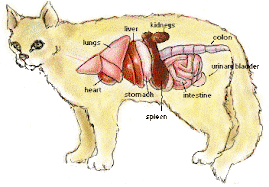Feline infectious peritonitis (FIP) is a disease caused by a coronavirus infection. Many different strains of coronavirus are capable of infecting cats, but most do not produce serious disease. FIP-producing strains are distinguished by their ability to invade and grow in certain white blood cells. The infected cells transport the virus throughout the cat's body. An intense inflammatory reaction occurs in the tissues where these virus-infected cells locate. It is this interaction between the body's own immune system and the virus that is responsible for the disease.
Infected cats shed coronavirus in their saliva and feces. Most cats become infected by inhaling or ingesting the virus, either by direct contact with an infected cat, or by contact with virus-contaminated surfaces like clothing, bedding, feeding bowls, or toys.
Although the virus can survive for a number of weeks in the environment, it is rapidly inactivated by most household detergents and disinfectants. An inexpensive and effective disinfectant is one part of household bleach in thirty-two parts of water (4 ounces of bleach per gallon of water). READ MORE HERE:http://www.vet.cornell.edu/fhc/brochures/fip.html
Saturday, December 29, 2007
FELINE INFECTIOUS PERITONITIS FIP
Posted by
THE ALLEY CAT FORUM
at
12:34 AM
![]()
Labels: CAT, CAT DISEASES, CAT HEALTH, CAT VETERINARIANS, FELINE DISORDERS, SICK CAT, VETERINARIAN
Sunday, October 28, 2007
How To Treat Diarrhea In Your Cat
Having a cat involves occasional unpleasant issues such as diarrhea. This condition usually is minor and temporary, and a little tender loving care from you can help your cat recover quickly.
Diarrhea is a commonly encountered problem that occurs when food is passed through the intestine too rapidly. It can be caused by allergies, milk, worms, spoiled food, or plants. There are also more serious causes such as tumors, viral infections, and diseases of the liver, pancreas, and kidney. It is important to seek professional help if your cat's diarrhea includes blood or your cat experiences severe depression or abdominal pain.
If your cat is experiencing a minor case of diarrhea, use the following cat care tips:Step 1: Remove all of the cat's food for at least 12 to 24 hours. Water is important to prevent cat dehydration during severe diarrhea. It should not be removed.
Step 2: If blood appears or if diarrhea continues for more than 24 hours, contact the veterinarian.
READ THE ENTIRE ARTICLE HERE;
http://home.howstuffworks.com/how-to-treat-a-cat-that-has-diarrhea.htm
Posted by
THE ALLEY CAT FORUM
at
12:00 PM
![]()
Labels: CAT DIARRHEA, CAT HEALTH, DIARRHEA IN CAT, SICK CAT, TREATMENT FOR CAT DIARRHEA
Monday, October 22, 2007
SICK CAT ? SIGNS TO LOOK FOR IN YOUR CAT
1. Inappropriate Elimination Behaviour
or Litter Box Use
Inappropriate and annoying elimination behaviors
by your cat can often indicate an underlying medical
condition and do not mean your cat is trying “to get
back” at you. These behaviors can include urinating or
defecating outside the litter box or other problems. A
cat with these behaviors may have any number of conditions,
including lower urinary tract disease, kidney
disease, urinary tract infection and diabetes mellitus.
2. Changes in Interaction
Cats are social animals and enjoy interactions with
their human family and often with other pets. Changes
in those interactions may signal problems such as disease,
fear and anxiety. It may also signal pain, which
can cause aggression.
3. Changes in Activity
A decrease or increase in activity can be a sign of a
number of conditions. Discomfort from joint disease
or systemic illnesses can also lead to a decrease in
activity. Increased activity is often seen with hyperthyroidism.
It’s important to understand cats don’t usually
slow down just because they are old.
4. Changes in Sleeping Habits
The average adult cat may spend 16 to 18 hours per
day sleeping. The key to differentiating abnormal
lethargy from normal napping is knowing your cat’s
sleeping patterns and noting any changes.
READ MORE;http://www.catclinic.com.au/newsletters-pdf/catsonly_Toxoetc2006.pdf
Posted by
THE ALLEY CAT FORUM
at
7:48 PM
![]()
Labels: ALLERGIC TO CATS, CAT DECLAW, CAT HEALTH, CAT NEWS, ebay, FELINE, GARFIELD, KITTEN SAFETY, KITTENS, KITTY LITTER, KLIBAN, SICK CAT, SICK KITTEN
Wednesday, October 17, 2007
CAT LEUKEMIA / FELINE FELV WHAT IS IT?
How is FeLV spread? Cats persistently infected with FeLV serve as sources of infection. Virus is shed in very high quantities in saliva and nasal secretions, but also in urine, feces, and milk from infected cats. Cat-to-cat transfer of virus may occur from a bite wound, during mutual grooming, and (though rarely) through the shared use of litter boxes and feeding dishes. Transmission can also take place from an infected mother cat to her kittens, either before they are born or while they are nursing. FeLV doesn't survive long outside a cat's body—probably less than a few hours under normal household conditions. READ MORE;http://www.vet.cornell.edu/fhc/brochures/felv.html
Posted by
THE ALLEY CAT FORUM
at
12:27 PM
![]()
Labels: CAT ADOPTION, cat care, CAT DISEASES, CAT DISORDERS, CAT HEALTH, CAT ILLNESSES, CAT LEUKEMIA, CAT SHELTERS, CAT SYPTOMS, cat vets, ebay, FELINE FELV, GARFIELD, KITTEN, KLIBAN, SICK CAT
Monday, October 8, 2007
HEARTWORM IN YOUR CAT
When it comes to heartworm disease, dogs and cats have a lot in common. But new research shows that in cats there is the potential for more severe reactions and even sudden death. Indoor cats are also at risk for heartworm disease. Cats get heartworm disease the same way dogs get it. Mosquitoes transmit the disease by biting an infected animal, then passing the infection on to other animals they bite.
Cases of heartworm disease in cats have been reported across the United States and many other countries. Heartworm disease is most common in areas where dogs are also at risk.
What are the signs?The most common signs of heartworm disease in cats - coughing , vomiting, breathing difficulties, weight loss, and lethargy - are often mistaken for other conditions such as asthma, pneumonia and digestive problems. In fact, most common clinical signs of heartworm disease in cats resembles bronchial asthma.
PreventionOnce a cat is diagnosed with heartworm disease, managing the disease can be difficult. Treatment, as well as non-treatment, is very risky, because there's currently no approved product for treating adult heartworms, and the onset of clinical signs is impossible to predict in cats that are left untreated. Even if the disease is treated, your cat may experience severe complications or even death when the worms die. Prevention is the best medicine. Ask your veterinarian about heartworm disease prevention for your cat. It will help give your feline friend the best chance for a long and healthy life.
Posted by
THE ALLEY CAT FORUM
at
9:56 PM
![]()
Labels: BLACKWHITE CAT, CAT DISEASE, CAT HEALTH, CAT VETERINARIAN, CATS, HEARTWORM, HEARTWORMS, MOSQUITOES, SICK CAT





















 Custom
Custom 

